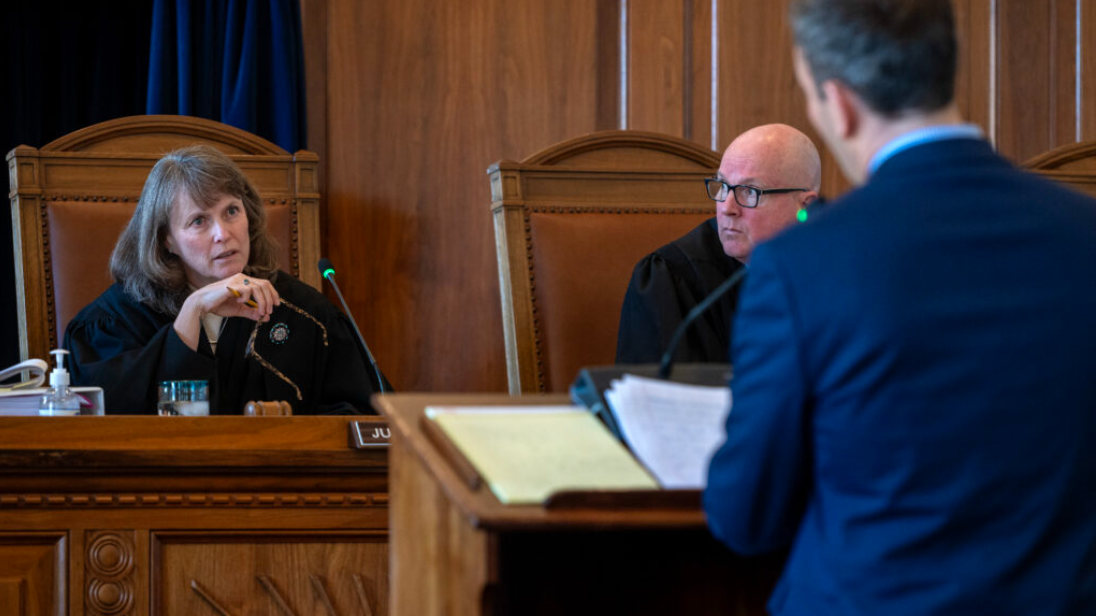
On Wednesday, December 13, New Mexico’s highest court convened to entertain oral arguments in the case State of New Mexico v. Board of County Commissioners for Lea County. In the lawsuit the State of New Mexico is challenging the legality of anti-abortion ordinances passed by four conservative southeastern New Mexico local governments – the City of Hobbs, Lea County, the City of Clovis and Roosevelt County.
According to the state’s Atty. Gen. Raúl Torrez (D), the ordinances, which “effectively” ban abortion in the jurisdictions where they have been passed, violate the New Mexico Constitution “…on grounds of both individual liberties and local government overreach,” states an article posted at ACLU-NM.org.
Attorneys supporting the legality of the ordinances refute Atty. Gen. Torrez’s argument by contending that the State of New Mexico’s Constitution “does not and cannot secure a right, privilege or immunity to act in violation of” federal law – specifically the Comstock Act – which bans mailing anything “obscene, lewd, lascivious” or anything “considered morally impure, including abortion pills or abortion-related materials,” as reported in a Source NM article.
At the end of the approximate one-hour hearing, the state’s Supreme Court justices made no ruling regarding the legality or illegality of the ordinances.
Ancient, Federal Comstock Act Used as Basis for Legality of Local Ordinances
The anti-abortion ordinances passed by the four local governments in late 2022 rely on the federal Comstock Act of 1873 as precedent. Attorneys for these local jurisdictions contend that the Comstock Act supersedes state law. In actuality, the ancient act has remained on the books since its inception in the nineteenth century; however, in reality, it has been for the most part dormant, especially since the 1973 passage of Roe v. Wade.
The reason Comstock was originally passed was to stop anything “corrupt”. Anti-abortion activists now rely on the outdated law to “…challenge the legality of abortion pills, as well as to stop abortion clinics and hospitals from obtaining equipment needed to perform abortions,” states Nathaniel Wexiel in an article posted at TheHill.com.
House Bill 7
In response to the four local anti-abortion ordinances passed in 2022, the New Mexico legislature in 2023 passed House Bill 7 (HB7) which was quickly signed into law by Gov. Michelle Lujan Grisham (D). The new law – the Reproductive and Gender-Affirming Health Care Act – “prevents governments or individuals from interfering with or discriminating against someone’s access or use of reproductive or gender identity health care”. Atty. Gen. Torrez contends that the local ordinances “infringe [on] New Mexicans’ constitutional rights to privacy, liberty, and bodily autonomy.” He said, “Although the Court has not decided whether the New Mexico Constitution’s due process guarantees include a right to choose whether to terminate a pregnancy, the broad, protective language of the State’s Constitution supports such an interpretation.”
At the high court hearing, Ellie Rushforth, the ACLU of New Mexico’s Managing Reproductive Rights and Gender Equity attorney, stated, “We know that abortion bans do nothing to protect anyone’s health and safety.” Rushforth added, “The New Mexico Supreme Court must uphold the rights of New Mexicans across the state to access the critical health care they need.” Rushforth was firm that reproductive health care decisions are personal. “They must remain between the person seeking care, their loved ones, and their medical provider. All new Mexicans deserve the dignity and respect to access the health care they need without fear of arrest, interrogation, or criminalization.”
Jonathan Mitchell, a former Texas solicitor general who represents Hobbs and Clovis, contends in the written arguments he prepared before the hearing that the New Mexico Constitution, as well as HB7, do not create “a right for people to mail abortion pills or ‘abortion-related paraphernalia’ because he argues it is in violation of the Comstock Act,” states the Source NM article.
Mitchell challenged Atty. Gen. Torrez to “identify anyone – real or hypothetical –who is being hindered in obtaining an abortion on account of the ordinances, or who is suffering a violation of their supposed constitutional rights.” Mitchell theorizes that anyone who feels “adversely affected by these ordinances” can sue on his/her own behalf.
Issue of Preemption
At the hearing justices raised the issue of preemption, asking whether state law or federal law applies to the case. In response Atty. Gen. Torrez said, “The Supreme Court should nullify the ordinances at issue in this case and prohibit their enforcement, not only because they are preempted by state law but because they constitute a form of gender based discrimination and are unconstitutional.”
Atty Gen.Torrez added that “the enactment of these ordinances is clearly preempted by the state’s decision to foreclose two local governments the opportunity to set independent licensing requirements for physicians or types of medical procedures in their jurisdictions.”
Atty Gen. Torrez also stated that the ordinances exceed “the authority of local governments to regulate health care access” and violate “the New Mexico Constitution’s guarantees of equal protection and due process of a woman’s right to bodily autonomy,” states The Hill article.
Representing Roosevelt County, attorney Erin Hawley of Washington, D.C. countered that state law “doesn’t prevent local governments from interfering with services such as abortion saying it [abortion] falls outside standardized medical obligations to patients,” states a KSFR news report. Hawley told justices that “abortion” is not “within the medical standards” of healthcare.
Also arguing for declaring the ordinances legal was the Alliance Defending Freedom. Justices were told, “State and local governments have the strongest interest in protecting the most fundamental of our human rights – the right to life – and it’s clear the New Mexico Constitution does not contain a right to take innocent, unborn life.”
The length of time it will take for justices, all Democrats or appointed by Gov. Lujan Grisham, to issue a final ruling on the legality or illegality of the four local anti-abortion ordinances is unknown. Currently, the ordinances have been temporarily blocked by the court and have no legal clout. The fact remains – abortion is legal in New Mexico, and the state’s Democratically-controlled legislature and administration remain committed to ensuring a woman’s right as well as that of her family, to control her own body and to attain reproductive healthcare.


